Germany serves as a classroom for supply chain management, engineering students
At Lipscomb, the city is our campus and the world is our classroom as we expand the borders of learning to all corners of the globe.
Kim Chaudoin |
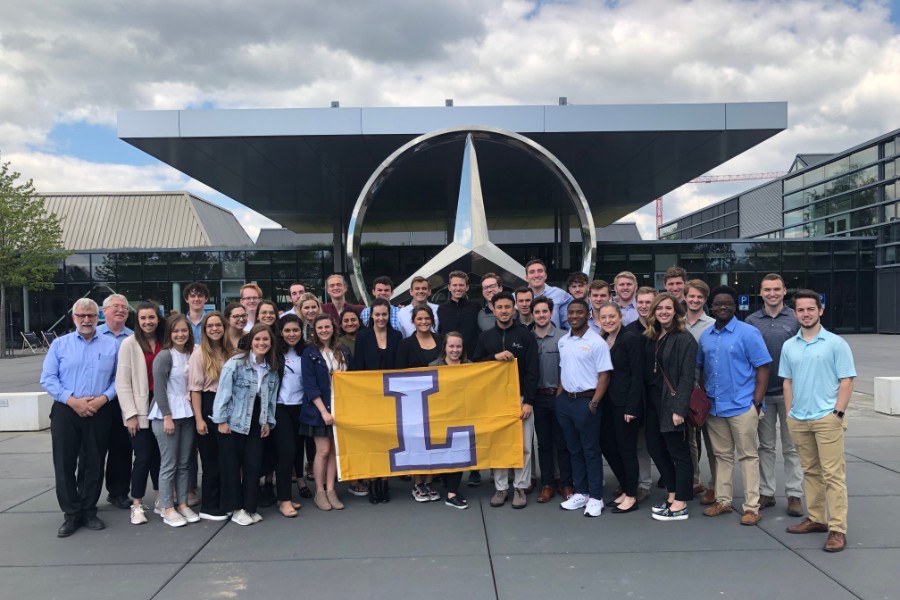
In May, a group of business and engineering students travelled to Germany to learn more about supply chain management, engineering and more.
The centuries old buildings and hillsides of Esslingen, Germany provided a scenic backdrop for students in Lipscomb’s College of Business and Raymond B. Jones College of Engineering to expand the borders of the traditional classroom for a more than three-week long travel study opportunity in May.
For the third consecutive year, a Lipscomb delegation, comprised of 31 business students and seven engineering students, traveled to Esslingen, a suburb of Stuttgart, a hub of technology and innovation, to experience business operations in a different culture. Andy Borchers, associate dean and professor in the College of Business; and Chris Gwaltney, professor and chair of the civil and environmental engineering program, and Fort Gwinn, associate dean and professor, both in the Raymond B. Jones College of Engineering, led the trip.
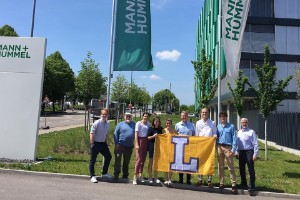
Engineering students toured the MANN+HUMMEL facilities as part of their studies in Germany.
Students earned college credits for the travel study course which ran from May 6-June 1. Business students completed “International Business Operations” and “Supply Chain Management” courses while three engineering courses were offered including “Project Planning and Engineering Economy,” “Engineering Ethics,” and “Vibrations.”
Among the many organizations with operations in the Stuttgart area that students toured are SAP, BASF, European Central Bank, Kärcher, the Porsche Museum, Mann+Hummel, state-of-the-art logistics facility Hahn and Kolb, Mercedes and Daimler. Students also heard from guest lecturer Michael Flad, professor from the Hochschule Esslingen, on BREXIT from a German perspective, had special classes taught by German professors and took day trips to visit facilities. In addition the group toured a number of historical and cultural sites including the Dachau concentration camp, Altes Rathaus mit Glockenspiel, the old city hall In Esslingen that houses an Astronomical clock built over 400 years ago and a tour of the of St. Dionys. In addition, Lipscomb professors conducted traditional course work.
“This global learning program is a wonderful opportunity for students to see what they are learning about in class lectures and textbooks in an experiential way. It also gives them a sense of the international scope of the business and engineering worlds that they will be working in,” Borchers said.
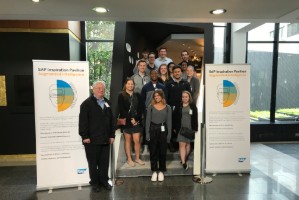
Business students toured the SAP offices in Stuttgart in May.
“The industrial sites in Germany most definitely give the students a perspective on production, development, and sustainability that they don’t see in the US,” said Gwaltney. “The trip is a great opportunity for students to explore the sites of Europe in a safe way while getting ahead in the classes. It’s also a great way for students and faculty to get to know one another in a more casual environment outside of the traditional classroom setting.”
Students lived in eco-sensitive housing in Esslingen during their stay and had three weekends for free travel to explore Europe.
“The students loved this global learning opportunity,” said Borchers. “Because of the sequential nature of their courses, labs and other requirements it is sometimes difficult for business and engineering students to study abroad. This trip provides them the opportunity to spend several weeks living in a community that provides them with a wealth of cross cultural experiences. That is one of the benefits of this particular program. We do this in May so students have the remainder of the summer for internships, jobs or to take other classes. It really gives them an opportunity to have an immersive experience.”
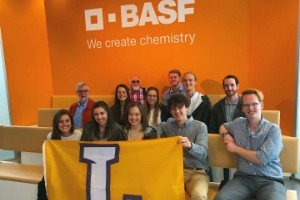
Students visited BASF as part of their travel study in Germany.
The students agree that the trip gives them a new perspective on their studies.
“This trip was an eye opening experience,” said business student Bennie Harris. “It was amazing to see business done in ways we can’t see here in the states.”
“The opportunity to both study and gain international experience was unforgettable. Learning about concepts in class and seeing them implemented the next day was extremely insightful,” said Ahmed Amaar, a business major.
Engineering student Kenzie Cohn weighed in as well:
“This experience was incredible,” she said. “You are given the unique opportunity to call a place halfway around the world home for a month. You get to grow and mature in you travel abilities and learn that not all trains go where you would want them too, but by the end of the month you travel like a local.”
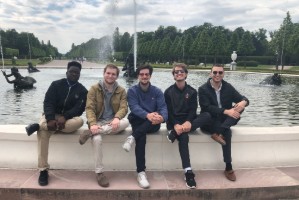
Students got to visit a number of historical and cultural sites while in Germany.
The classes are short but sweet and the small class size and new environment makes it easy to have an in depth learning experience,” Cohn continued. “On the weekends I was able to tour Germany, go to Spain and go to France. Other groups traveled to everywhere from Greece to Italy to Switzerland. It is well worth it and I highly recommend going.”
For more information about the College of Business and the supply chain management program, visit www.lipscomb.edu/business.
For more information about the Raymond B. Jones College of Engineering, visit www.lipscomb.eduengineering.